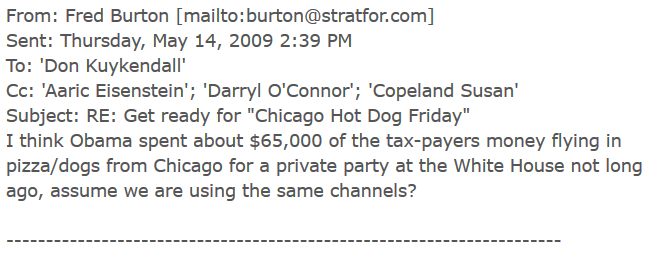An Obama Meme About Pizza Reveals a Bigger Problem
By:
Perhaps you've noticed, but emails have played a pretty big role in this year's presidential election.
From the reanimated investigation into Democratic nominee Hillary Clinton's private e-mail server, to Wikileaks' release of internal emails from both the Democratic National Committee and Clinton campaign chairman John Podesta, voters have been bombarded with internal communications that range from significant to totally mundane.
But the leaks don't stop there. Wikileaks also routinely publish hacked emails from other government sources. And a leak from 2012 that recently resurfaced encapsulates everything wrong with an internet driven by misinformation, conspiracy theories, and baseless speculation.
The email is part of a May 2009 chain from the defense intelligence contractor Stratfor. Though it has the inconspicuous title “RE: Get ready for "Chicago Hot Dog Friday," it’s actually a strange allegation against President Barack Obama:
“I think Obama spent about $65,000 of the tax-payers money flying in pizza/dogs from Chicago for a private party at the White House not long ago […] ?” wrote Stratfor analyst Fred Burton in response to a previous email that the company would be serving hot dogs.
 Wikileaks - wikileaks.org
Wikileaks - wikileaks.org
Not only are some Republicans outraged at the alleged wasteful spending, a few members of the alt-right movement think it’s even worse — a reference to a supposed “pedophile code” used to enable the smuggling of young boys (“hot dogs”) and girls (“pizza”) for orgies.
To these conspiracy minded individuals, the innocuous email is proof that Obama is involved in vile sex parties, and Hillary is continuing that evil legacy.
To be sure, none of this can be proven on any level. While the White House did serve hot dogs and pizza for the president’s Super Bowl party in February 2009, there’s no compelling evidence that doing so cost $65,000, or that they were flown in from anywhere. Burton doesn’t even seem sure of the claim. With that in mind, it seems fairly easy to dismiss it as hearsay and sour grapes.
As for the “pedophile code," it appears to be a recent invention of the alt-right, based on other emails from the Podesta leak that make references to food. There is no compelling evidence the code is real, and this particular email isn’t even part of the Podesta leaks, as it wasn’t sent to or from him. It also wasn't sent to or from anyone in Obama's inner circle.
The hubbub over the Stratfor email illustrates a much more pervasive problem on the internet; if people want to believe something, they’ll believe it, no matter how ridiculous, unproven, or impossible to verify it is. And once a fact-free allegation is out there, it’s virtually impossible to get rid of it, even if it’s debunked or unsupported by evidence.
A number of scholars have referred to the combination of dubious information and an Internet full of people willing to believe it as the “post-fact” world. In this universe, facts don’t mean anything, and fact-checking is the domain of elitists who want you distracted from “the truth.”
Does the internet make it too easy to believe things that aren’t true simply because we want them to be true? And are we living in a post-fact world?
Naturally, we can’t even agree on that.
In July 2016, the non-profit journalism school Poynter went back decades to find laments of lies being embraced by politicians and the public for an article called “No, We Aren’t Living in a Post-Fact Era.”
And yet, a number of luminary writers from the New York Times, the Guardian, Salon, and the Washington Post have used the term, specifically in reference to the presidential campaign of Donald Trump.
Beyond that, the popularity of sites like Factcheck.org, Politicfact, Snopes, and pro-skepticism and science writers shows that there is a deep hunger for the truth. Some people don’t care about facts, but many other people do — and there’s more opportunities to find them than ever. So whether society lives in a post-fact world is debatable, but individuals don’t have to.
They simply have to seek out the facts for themselves.
As for the Stratfor email, it shows just how easy it is to be a post-fact world dweller. Despite being linked with Podesta, it has nothing to do with him — and was leaked in 2012, well before any “pedophile code” was dreamed into existence.
